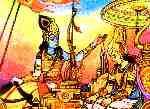|
 Page1
Page1
Bhagavan Vyasa, the celebrated compiler of the Vedas, was the son of the great sage Parasara. It
was he who gave to the world the divine epic of the Mahabharata.
Having conceived the Mahabharata he thought of
the means of giving the sacred story to the world. He meditated on Brahma, the Creator,
who manifested himself before him. Vyasa saluted him with bowed head and folded hands and
prayed:
"Lord, I have conceived an excellent work,
but cannot think of one who can take it down to my dictation."
Brahma extolled Vyasa and said: "O sage,
invoke Ganapati and beg him to be your amanuensis." Having said these words he
disappeared. The sage Vyasa meditated on Ganapati who appeared before him. Vyasa received
him with due respect and sought his aid.
"Lord Ganapati, I shall dictate the story
of the Mahabharata and I pray you to be graciously pleased to write it down."
Ganapati replied: "Very well. I shall do
as you wish. But my pen must not stop while I am writing. So you must dictate without
pause or hesitation. I can only write on this condition?'
Vyasa agreed, guarding himself, however, with a
counter stipulation: "Be it so, but you must first grasp the meaning of what I
dictate before you write it down."
Ganapati smiled and agreed to the condition. Then the sage began to sing the story of the Mahabharata. He would occasionally compose some complex stanzas which would make Ganapati pause a while to get at the meaning and Vyasa would avail himself of this interval to compose many stanzas in his mind. 'Thus the Mahabharata came to be written by Ganapati to the dictation of Vyasa.
Author : Shri C. Raja Gopalachari
|